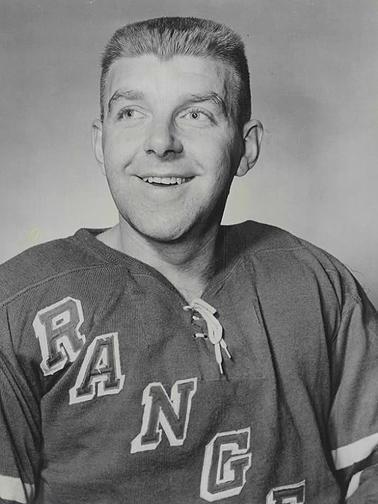Gump Worsley (Lorne John Worsley)

At the outset of his career, Gump Worsley played four years in the minor leagues, most notably for the New York Rovers of the Eastern Hockey League (EHL), the St. Paul Saints of the United States Hockey League (USHL), and the Saskatoon Quakers of the Western Hockey League (WHL). For three straight seasons between 1950 and 1952, he achieved success with all three teams, garnering First Team All-Star and leading goaltender recognition. In the fall of 1952 he was signed by the New York Rangers of the NHL; though playing for a last place team, won the Calder Memorial Trophy as rookie of the year. However, after asking for a $500 a year pay increase, he was promptly returned to the minor leagues the following season. In 1954, playing for the Vancouver Canucks of the WHL, he won the league most valuable player award. In 1954, Worsley resumed as the Rangers starting goaltender, beating out future NHL star Johnny Bower. Wearing the traditional number 1 for goaltenders, he toiled for the Rangers for the next nine seasons, generally playing well for poor performing teams. In the summer of 1963, he became involved in a proposed players’ union, and was promptly traded to the Montreal Canadiens. While he was relegated to the minor-league Quebec Aces for parts of two seasons — and characteristically winning First Team All-Star honors in the AHL in 1964 — Worsley played his best years for the Canadiens as a member of four Stanley Cup-winning teams: 1965, 1966, 1968 and 1969. His best season was 1968, where he followed up a Vezina-winning performance and a career-low 1.98 goals against average by going undefeated in the playoffs with eleven straight wins. In dispute with Sam Pollock, Montreal general manager, over refusal to be demoted to the minors, and coach Claude Ruel’s consistent playing of Rogatien Vachon, he quit in the midst of the 1969–70 season. Suspended for not reporting to the Canadiens’ Montreal Voyageurs farm team, he was replaced by Phil Myre.
Gump Worsley was lured from retirement by the Minnesota North Stars to play in tandem with Cesare Maniago; he starred for parts of five more years, retiring at the age of 44 after the 1973–74 season. His best season with the North Stars was 1972, where he was second in the league with a 2.12 goals against average. Named to play in the 25th National Hockey League All-Star Game, Worsley was the first goaltender to have won 300 games and lost 300 games. This feat was later accomplished by Curtis Joseph. Worsley was known for his wry sense of humour and various eccentricities. Early in his career with the Rangers, regularly facing 40–50 shots a night, he was asked: “Which team gives you the most trouble?” His reply – “The New York Rangers.” Accused by Rangers’ coach Phil Watson of having a beer belly, he replied, “Just goes to show you what he knows. I only drink Johnnie Walker Red.” Gump Worsley was vehemently opposed to wearing a mask. He was the second-to-last professional hockey goaltender to play without a mask. Andy Brown of the Indianapolis Racers was the last, the following season – wearing a mask in the last six games of his career. Asked about why he chose to go without, Worsley told reporters: “My face is my mask.”
Gump Worsley was also well known for his fear of flying. On November 25, 1968, en route to Los Angeles, he suffered a nervous breakdown after a rough flight from Montreal’s Dorval Airport to Chicago. Subsequently, he received psychiatric treatment and missed action. It is said upon emerging from retirement to play for the North Stars he was assured, as Minnesota was in the central part of the continent, the team traveled less than any other in the league. In his early days he was an outstanding soccer player, beginning his career as a junior with Westmount; in 1948 he was a member of the Montreal youth all-star team. As a promising young player, he soon attracted attention; the following year he moved up to McMasterville in the Montreal League. There he was selected to play in a trial game from which the Montreal all-stars were chosen to play the touring English club Fulham in 1951. In the summer of 1952, while playing hockey for the Saskatoon Quakers, he played centre forward for the Saskatoon All-stars against the touring Tottenham Hotspur from England. By 1953 he was playing centre half for the Montreal Hakoah; he captained Montreal Hakoah at centre half in the Canadian Challenge Trophy final. In the National Challenge Cup final Hakoah lost to Westminster Royals in a three-game series, two of which ended in ties. In 1954, continued his soccer career with Montreal Vickers. His father was also an outstanding soccer player and won a Canadian championship medal with Montreal Grand Trunk in 1919.
Born
- May, 14, 1929
- Montreal, Quebec, Canada
Died
- January, 26, 2007
- Beloeil, Quebec, Canada
Cause of Death
- heart attack

